Eritrea: First risky step in an Eritrean's journey to Europe
By Emmanuel Igunza
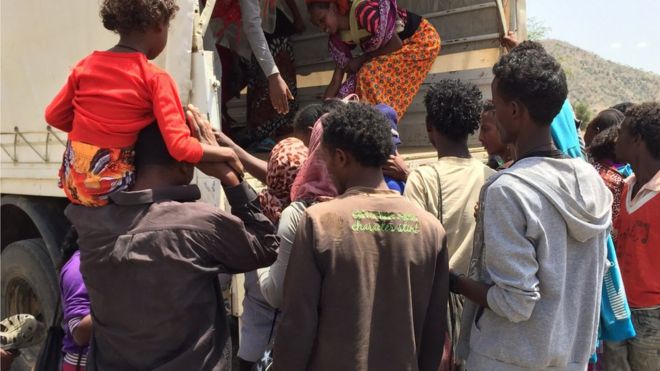
"Even after I fell down, I could hear the bullets whizzing past me," Weldab tells me from a clinic bed in Mai-Aini refugee camp in Ethiopia.
"I was lucky that I escaped. There were 10 of us in total; I don't know what happened to the rest of my friends."
This was the young man's second attempt to leave his homeland.
He walked for most of the journey. Many of the refugees I met walked, mostly at night to avoid being detected.
Some told me they paid traffickers between $100 and $700 (£65 and £450) to show them the way.
Others said that relatives in Europe have been known to pay the traffickers directly.
They would be taken by car part of the way and then shown the "safest" route by foot.
Although there is no war or famine in Eritrea, it accounts for the second largest number of asylum-seekers arriving in Europe, after Syria.
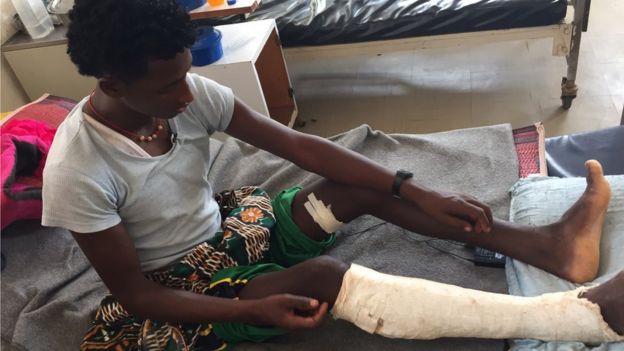
Weldab, who did not want to give his full name, had paid a fee to go to Europe the first time he tried to flee.
But it went wrong at the border with Sudan, when he was arrested on the Eritrean side and spent three weeks in police cells.
He told me that back home he only dreamt of two things: Playing football and going abroad - because he wants to avoid being conscripted into the army.
The UN has witnessed a huge rise in the number of people crossing from Eritrea into Ethiopia in May and June.
In just two days I saw nearly 500 refugees coming through dozens of illegal routes on the heavily guarded border.
Like Weldab, most are young people wanting to avoid conscription, which is compulsory after finishing school for both men and women.
It is supposed to last 18 months, but if not picked to continue their studies after this time - people can be forced to stay in the army until their 40s.
Many of the refugees are women, some carrying babies on their backs.

Eritrea - key facts
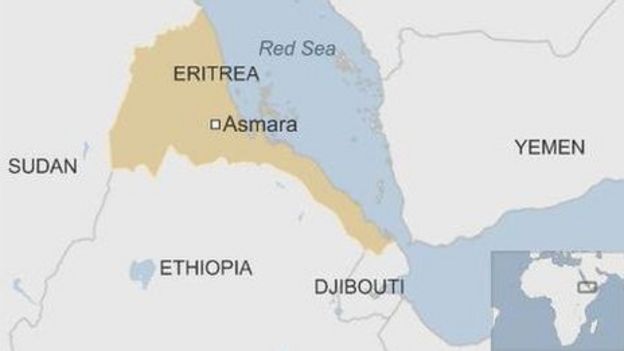
- Nation of six million on Red Sea - one of Africa's poorest countries
- One-party state - no functioning constitution or independent media
- Former Italian colony, later formed loose federation with Ethiopia
- 1962 - Ethiopian Emperor Haile Selassie dissolved Eritrean parliament, seized Eritrea
- Eritrean separatists - the Eritrean People's Liberation Front - fought guerrilla war until 1991, when they captured capital Asmara
- Eritrea voted for independence in 1993
- May 1998 border dispute with Ethiopia led to two-year war costing 100,000 lives
- Still no peace settlement - thousands of troops face each other along 1,000km (620-mile) border
Inside the secretive state of Eritrea
Eritrean migrants face new asylum battle

In one of the Ethiopian military camps that we visited, a section had been turned into a temporary shelter for those arriving.
Women and babies shared a few mattresses laid down on the floor of a structure made from wood and corrugated iron.
Outside in the scorching sun, more women sat in groups under the shades of trees.
Army deserter
Some young men covered their faces with their clothes and hands as we approached them, too afraid to be filmed.
"They won't talk to you," one elderly woman carrying a baby told me through an interpreter. "They are all scared."
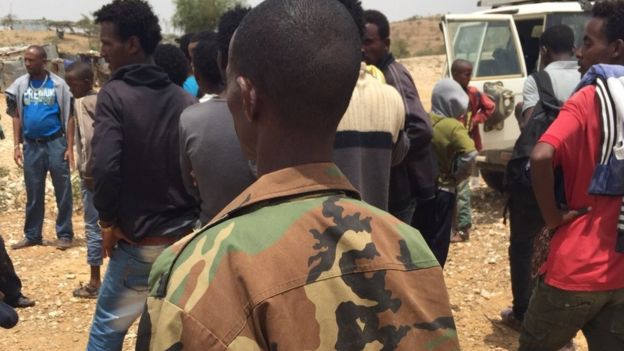
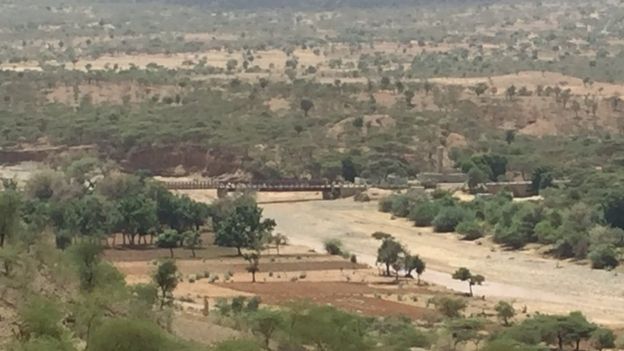
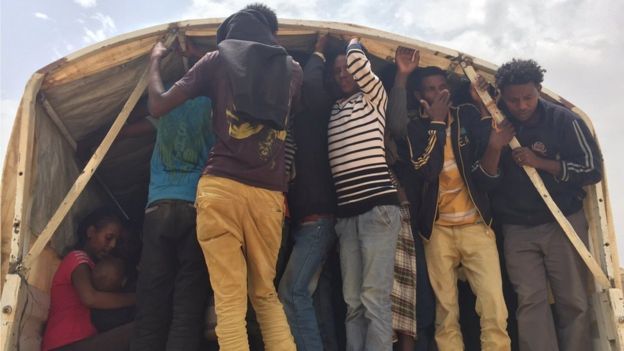
Sitting next to the woman was a man in military camouflage, who said he had deserted the army after he was not allowed to leave despite being diagnosed with a serious ear problem.
"How could I continue serving under such pain?"
He left his wife and seven children behind and walked to the border with his gun; it took him just a day because he knew the area well.
"It is a tough choice as I don't know if I will ever see them again. But I know they will understand; it was a matter of life or death. At least here, they will know I am safe and alive."
He joins more than 150,000 Eritrean refugees living in Ethiopia and will get a new home in one of the six camps in the Tigray and Afar regions in the north of the country.
The lone child
Young children have also been caught up in the exodus. In July alone, hundreds as young as seven made it to Ethiopia unaccompanied.
I met 13-year-old Yordhanos, who with her four friends now lives at special section of the camp reserved for children.
She too said she had left to avoid being conscripted when she left school.
"It was hard leaving our friends and families behind but we just ran because of fear," she says, explaining they literally ran over the border, terrified of being shot.
The area is heavily fortified because of a border war fought more than 15 years ago.
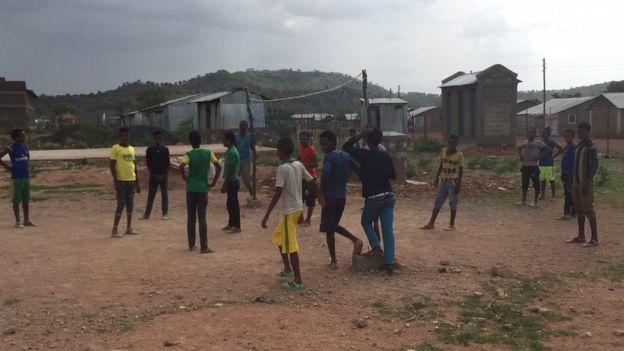
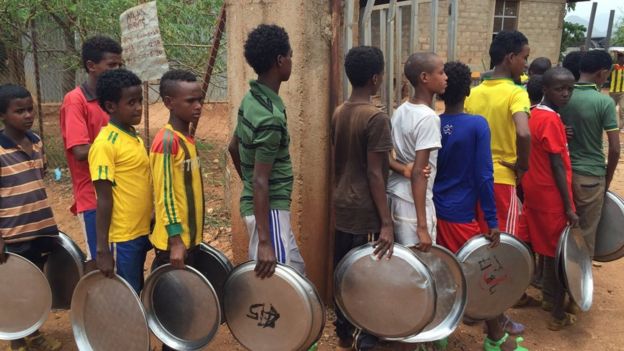
The children's compound has a football and basketball area and children are able to attend informal classes.
"I had an uncle here in Ethiopia, he came here nine years ago. But I don't know where he is," says Yordhanos, who hopes to make contact with him.
The dead in the Mediterranean
To try and discourage young people from carrying on to Europe, the UN refugee agency (UNHCR) and others have started projects like metal- and wood-workshops at the camps.
There are also computer and dress-making courses.
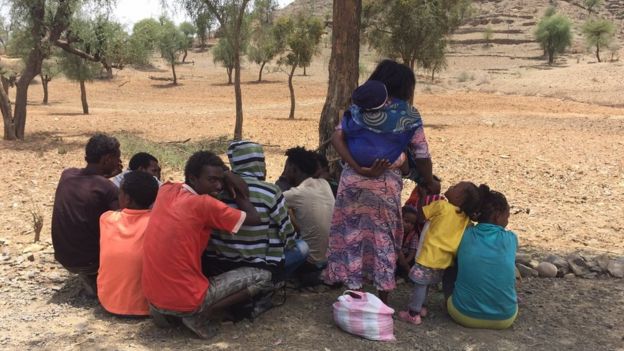
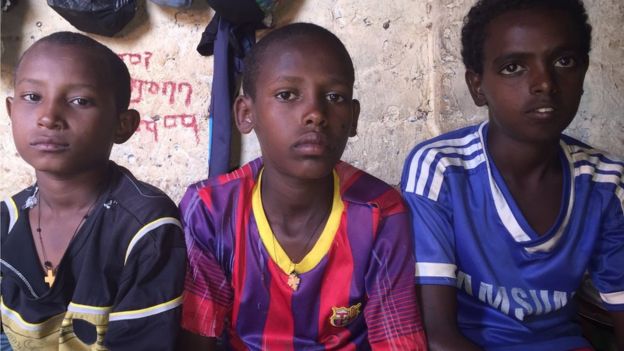
But UNHCR field officer Safi Ilunga tells me the migration continues.
"We try to show them how it is dangerous and risky to go."
Only three of the people I spoke to openly admitted they wanted to go to Europe, the rest were guarded about their plans.
But this is still Weldab's intention despite his injury - and despite the fact that the journey could end tragically in a desert or the Mediterranean Sea.
Europe is his goal, and he is determined to get there.


![[AIM] Asmarino Independent Media](/images/logo/ailogo.png)
